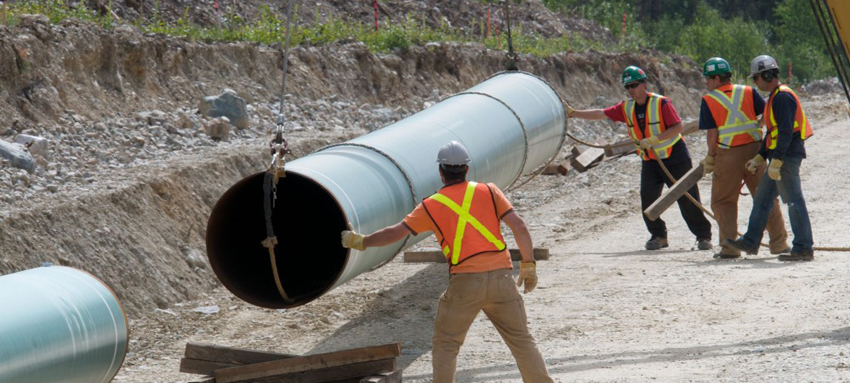Support strong Canadian climate journalism for 2025
One of the significant economic costs of constructing Trans Mountain’s heavy oil pipeline is the impact it will have on B.C. motorists at the pumps. This is because the price to transport petroleum products to British Columbia along the existing Trans Mountain system will more than double once the expansion becomes operational. As confirmed by Natural Resources Canada, transportation costs for delivery of crude oil and petroleum products to British Columbia are passed onto consumers.
There are two major sources of petroleum supply along Trans Mountain’s existing system that affect B.C. residents. These are light crude oil supply to the Chevron refinery in Burnaby, which processes crude into gasoline, as well as refined product processed in Alberta and shipped by Suncor and Imperial Oil along the legacy pipeline for retail distribution to Petro Canada and Esso stations. There are relatively modest amounts of petroleum shipped to Kamloops where loading to and from central and northern British Columbia takes place. Effectively, the transportation cost along Trans Mountain’s existing pipeline affects prices at the pumps for most of the gasoline sold in the province.
The cost to deliver light crude oil or refined petroleum products to Burnaby along the existing line and under its current cost structure is $2.20 per barrel. Kinder Morgan has always planned to help pay for Trans Mountain's twin by raising the tolls charged to shippers that serve British Columbia markets along the legacy line. With the newly-announced higher capital cost for the project of $7.4 billion, it is possible to calculate the full impact.
A $7.4 billion capital cost for Trans Mountain's twin raises tolls for light oil and petroleum products delivered to Burnaby along the existing line to $5.64 per barrel--by 156 percent. That’s right, after the new pipeline is built, the cost to ship the same light oil and gasoline to British Columbia's marketplace along the existing pipeline will be $3.44 a barrel higher because the line that serves British Columbia will help pay for the line intended to serve yet-to-be developed offshore markets. This increase in transportation costs equates to 2.2 cents a litre.
Toll rates amount to "a direct subsidy from B.C. residents to oil producers"
B.C. motorists buy about 4.7 billion litres of gasoline a year. At 2.2 cents a litre on gasoline sales of 4.7 billion litres, the financial drain from the wallets of B.C. consumers to the treasuries of multinational oil producers comes in at just over $100 million each year.
Kinder Morgan informed the National Energy Board (NEB) back in 2012 that toll rates on the 60-year-old pipeline serving B.C’.s market needed to more than double to help pay for a new pipeline intended to serve offshore interests. It did not concern the federal regulator that increased toll rates for the existing system--solely to support the new pipeline--is a direct subsidy from B.C. residents to oil producers.
When intervenors such as myself and the City of Burnaby raised the cost at the discredited NEB public interest review in 2014, the Board ruled the cost to the B.C. economy from higher prices at the pump was outside the scope of its public interest assessment. The Board refused to consider this, or any, economic cost from the project.
B.C. motorists will end up paying more than $100 million a year because of increased transportation costs approved by the NEB to pay for a pipeline the majority of British Columbians do not want. The $25 million per year that Premier Christy Clark says she negotiated as a “fair sharing of benefits” in the non-legally binding memorandum of understanding with Kinder Morgan pales by comparison. The net cost of $75 million per year to British Columiba provides another glaring example of how the private interests of some of Premier Clark’s largest financial donors take priority over the economic interests of British Columbians.






Comments
All I can say is that the National Observer and Robyn gets an A++++ for this article and the quality of reporting. A big thank you to the editors and contributors. I am so pleased that I subscribed.
David Todtman
2.2 cents more for a litre of gasoline won't be enough to get more people out of their cars. As we know, CO2 (carbon dioxide) is the principle greenhouse gas (GHG) linked to climate change. According to Natural Resources Canada (NRC), for every litre of gasoline used, a vehicle produces about 2.3 kilograms of CO2 (2.68 Kg for diesel). In 2015, net sales of gasoline and diesel in Canada (net sales represent the amount of taxable fuel actually consumed on public roads in Canada) were 42,563,098,000 litres and 17,988,762,000 litres respectively. At 2.3 Kg/litre and 2.68 Kg/litre, the amount of CO2 emissions produced in Canada by road motor vehicles in 2015 were at around 146 megatons (Mt). That same year, British Columbia motorists emitted a little bit more than 15.6 Mt, or 10.7% of all Canadian emissions (Ontario, Quebec and Alberta levels were at 35.5%, 19.7% and 17.5% respectively). At 10.8 Mt, Alberta CO2 emissions from diesel consumption represented more than 42% of all the province's emissions from road motor vehicles.
(source: Statistics Canada, Nov. 14, 2016: Sales of fuel used for road motor vehicles by province and territory)
GHG emissions from the transportation sector has grown at an average annual growth of 1.1% since 1990 compared to 0.7% for total Canadian GHG emissions. In 2014, emissions from the transportation sector (includes passenger cars, light trucks, aviation, bus, rail, and motorcycle) were 171 Mt, roughly 23% of total Canadian GHG emissions.
Emissions from passenger aviation, bus, rail, and motorcycle have remained largely flat at 9 Mt from 1990 to 21014. Emissions from light trucks have more than doubled, from 22 Mt in 1990 to more than 50 Mt in 2014, due to the growing "consumer preference" for SUVs and pickup trucks (passenger car emissions went from 52 Mt to 36 Mt during the same period).
(source: National Energy Board Market Snapshot, July 14, 2016: Increased GHG emissions from the transportation sector reflect major consumer and business trends)
Production of oil and gas won't go down as long as the demand for fossil fuel products goes up. Higher taxes on gasoline, diesel and gas guzzling vehicles are some of the most efficient ways to reduce emissions from the transportation sector. Years of information and education on the negative effects of consuming fossil fuels on the environment and public health don't seem to work in changing people behaviour.
The automakers have also been able to get governments to defer or abandon many of the requirements they improve fuel eficiency in new vehicles. While other countries have made great strides, North America has stagnated or gone backwards. The fraudulent mileage promises from car companies have been exposed and the US made changes, but Canada continues to let them get away with it.